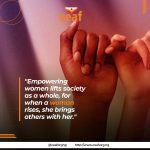Breaking Barriers: Education for the Girl Child and the Legacy of Namibia’s First Female President
As we celebrate Day 11 of the #16DaysOfActivism, it’s essential to reflect on the powerful connections between women’s leadership, gender equality, and education. The #16DaysOfActivism is a global campaign dedicated to ending violence against women and girls, advocating for their rights and empowering them to break free from the cycle of abuse and discrimination. Day 11 invites us to continue amplifying the voices of women who inspire change, like Namibia’s first female president, Dr. Hage Geingob’s deputy, Hildegarde Ndangi, a trailblazer who has shown that leadership is not gender-bound.
Dr. Geingob’s victory in 2014 marked a milestone in Namibia’s democratic history, but as we celebrate women in leadership roles, we also recognize the importance of fostering an environment where young girls can dream big. Education is at the heart of this transformation. Ensuring that girls have access to quality education is not only a matter of individual empowerment but also a crucial step in breaking the cycle of violence, poverty, and inequality that too often hinders the lives of girls.
The Importance of Educating the Girl Child
Educating girls is one of the most effective ways to lift entire communities out of poverty and ensure long-term sustainability. Studies have shown that when girls are educated, they are more likely to delay marriage, start families later, and have healthier children. Education also provides girls with the knowledge and skills to challenge gender-based violence, empowering them to stand up for their rights, contribute meaningfully to their communities, and step into leadership roles, just like Hildegarde Ndangi.
In Namibia, where gender inequality has historically been a barrier to progress, having a female leader exemplifies the power of education. Hildegarde’s rise to political prominence stands as proof that with the right education and support, women can rise to the highest levels of leadership. Her story sends a message to young girls across the world that they too can lead, innovate, and make a difference.
#16DaysOfActivism and the Path to Gender Equality
As we observe Day 11 of the #16DaysOfActivism, we are reminded that this movement is about more than just awareness; it’s about tangible change. It’s about ensuring that girls are safe from violence and have the tools they need to succeed. From early childhood education to leadership training, every step in a girl’s educational journey is crucial for her well-being and future opportunities.
By committing to this cause, we align ourselves with global movements dedicated to combating all forms of gender-based violence and ensuring that girls everywhere have the chance to live without fear, access education, and pursue their dreams. In Namibia, as in many parts of the world, the fight for gender equality continues, and it begins with the simple, yet profound, right to education.
On Day 11 of the #16DaysOfActivism, let us celebrate the progress made by women in leadership positions, such as Namibia’s first female president, and reaffirm our commitment to the education of every girl. For when we invest in educating girls, we not only lift them up—we build a better, more equitable world for all.



0 Comments